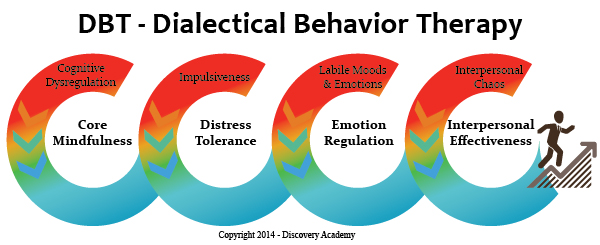Opening Healing Courses: DBT London Provides Specialized Assistance
Opening Healing Courses: DBT London Provides Specialized Assistance
Blog Article
Nurturing Emotional Strength and Self-Awareness With Dialectical Behavior Therapy (Dbt) Solutions: Your Journey to Inner Peace
In the quest of emotional durability and self-awareness, the utilization of Dialectical Behavior Therapy (DBT) solutions offers a structured strategy that integrates numerous fundamental principles to cultivate inner tranquility. Understanding the core tenets of DBT supplies a strong foundation for individuals looking for to browse their emotional landscape with higher quality and control.
Understanding DBT Basics
A thorough comprehension of Dialectical Behavior modification (DBT) fundamentals is essential for comprehending its principles and application in emotional strength - DBT London. DBT is a restorative technique created by Marsha M. Linehan to aid individuals struggling with emotional dysregulation, usually connected with conditions like borderline character condition. The core principles of DBT revolve around four main modules: mindfulness, distress tolerance, emotion regulation, and interpersonal effectiveness. Mindfulness is the foundation of DBT, emphasizing present moment awareness without judgment. Distress tolerance abilities outfit individuals to endure and survive crises without making spontaneous decisions. Emotion policy techniques assist individuals identify and take care of extreme emotions effectively. Last but not least, social performance abilities show people exactly how to assert their demands while keeping connections. By understanding these basic facets of DBT, people can cultivate psychological durability by learning to handle their emotions, navigate partnerships, and deal with upsetting situations more properly. This foundational knowledge establishes the stage for the effective application of DBT principles in promoting psychological well-being and internal peace.

Establishing Emotional Policy Skills
Developing proficiency in psychological law abilities is crucial for enhancing one's capacity to browse difficult circumstances and manage extreme feelings successfully. Psychological policy involves the ability to recognize, comprehend, and manage one's feelings in a healthy and balanced and useful manner. By sharpening these skills, people can cultivate a better feeling of self-control and durability when faced with adversity.
One secret facet of establishing psychological policy skills is learning to identify and label various emotions accurately. This self-awareness enables people to identify the origin of their feelings and react appropriately. In addition, practicing mindfulness techniques can assist individuals remain present in the minute and stop overwhelming feelings from hijacking their activities and thoughts.
Moreover, executing healthy and balanced coping techniques, such as deep breathing exercises, dynamic muscle mass leisure, or grounding methods, can give individuals with reliable tools to control their emotions during times of distress. By continually practicing these abilities, people can build a strong structure for emotional durability and self-awareness, inevitably fostering inner tranquility and well-being.

Enhancing Interpersonal Effectiveness
With a solid structure in psychological law abilities, people can currently concentrate on refining their social efficiency to navigate social communications with better convenience and success. Social efficiency, a critical part of Dialectical Behavior Treatment (DBT), furnishes individuals with the required tools to connect assertively, established limits, and develop healthier relationships. By finding out to reveal requirements and opinions plainly while respecting the perspectives of others, people can cultivate a lot more purposeful connections check and decrease problems in their communications.

Inevitably, improving social click to find out more efficiency via DBT encourages individuals to navigate different social contexts with compassion, credibility, and durability, cultivating even more fulfilling and harmonious relationships in their lives.
Exercising Mindfulness Techniques
Mindfulness strategies play an essential function in enhancing psychological regulation and promoting self-awareness in people going through Dialectical Behaviour Treatment (DBT) By cultivating present-moment understanding without judgment, mindfulness empowers people to observe their thoughts and feelings with approval, causing a deeper understanding of their internal experiences. With regular technique of mindfulness methods such as conscious breathing, body scans, and mindful observation, people can establish a heightened feeling of self-awareness and emotional strength.
One essential mindfulness strategy used in DBT is the "sensible mind" idea, which motivates individuals to incorporate their emotional and logical minds to make well balanced decisions - DBT London. This technique enables people to navigate psychological triggers with a calmer and more reasonable approach, minimizing impulsive reactions. In addition, mindfulness techniques help in grounding people in today moment, guiding them far from rumination on past occasions or anxiousness about the future
Structure Distress Tolerance Methods
To boost emotional durability in people undertaking Dialectical Behaviour Treatment (DBT), it is essential to focus on structure effective distress tolerance methods. Creating these strategies is vital for people to browse through difficult circumstances without coming to be overloaded. Distress resistance skills help individuals deal and withstand with extreme emotions, dilemmas, or scenarios where they might be attracted to participate in hazardous habits.
One secret distress tolerance method usually taught in DBT is the ACCEPTS acronym, which stands for Activities, Contributing, Comparisons, Emotions, Pushing away, Thoughts, and Sensations. These skills offer individuals with a toolbox of methods to distract themselves from upsetting emotions or situations in a healthy manner.
Additionally, learning exactly how to self-soothe via tasks like deep breathing exercises, taking a warm bathroom, or engaging in pastimes can also help develop distress resistance. By including these strategies right into day-to-day practice, people can better take care of tension, manage emotions, and ultimately grow a greater feeling of emotional strength.
Conclusion
To conclude, the journey in the direction of internal peace through Dialectical Behavior Treatment (DBT) includes recognizing its principles, developing emotional policy skills, enhancing social performance, exercising mindfulness methods, and structure distress resistance approaches. By using these methods, people can support emotional strength and self-awareness, causing a greater feeling of inner peace and wellness. DBT London. Incorporating DBT services right into one's life can give useful tools and resources for handling emotions and partnerships successfully
Understanding the core tenets of DBT provides a strong structure for individuals looking for to browse their click this link emotional landscape with greater clarity and control. By recognizing these basic facets of DBT, individuals can cultivate emotional strength by discovering to handle their feelings, navigate relationships, and cope with stressful circumstances more successfully.Mindfulness strategies play a pivotal function in boosting emotional policy and promoting self-awareness in individuals undertaking Dialectical Behaviour Treatment (DBT)One basic mindfulness strategy utilized in DBT is the "wise mind" principle, which encourages individuals to incorporate their psychological and reasonable minds to make balanced choices.To boost psychological strength in individuals undertaking Dialectical Practices Therapy (DBT), it is necessary to concentrate on structure reliable distress resistance methods.
Report this page